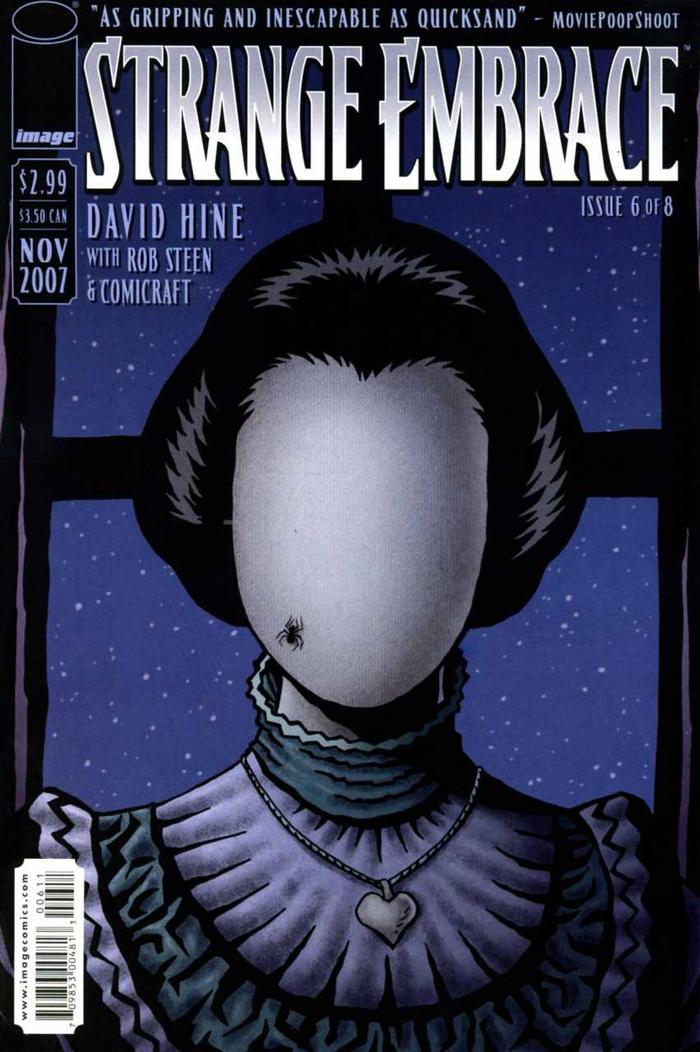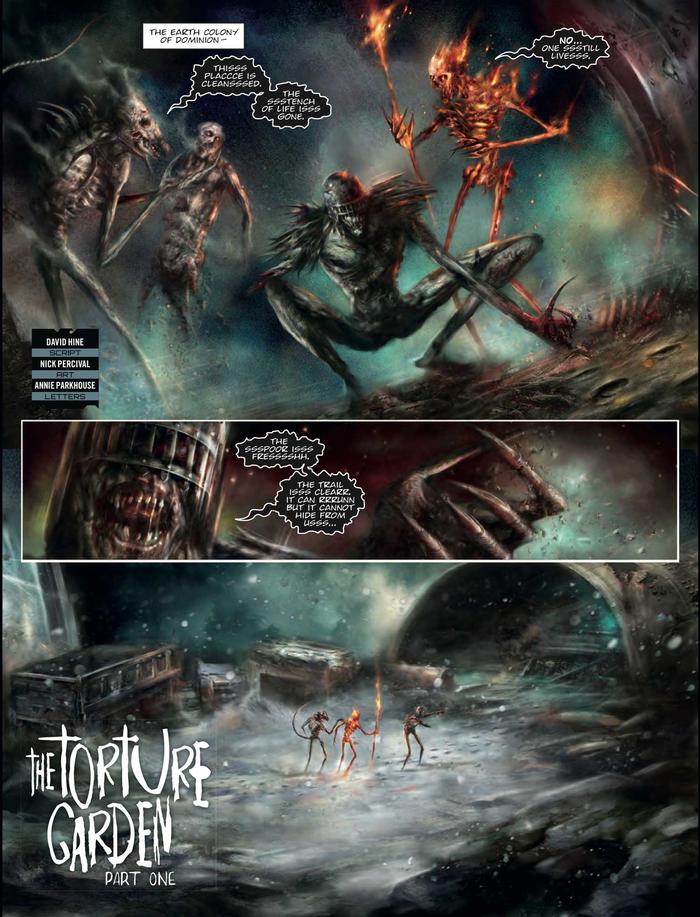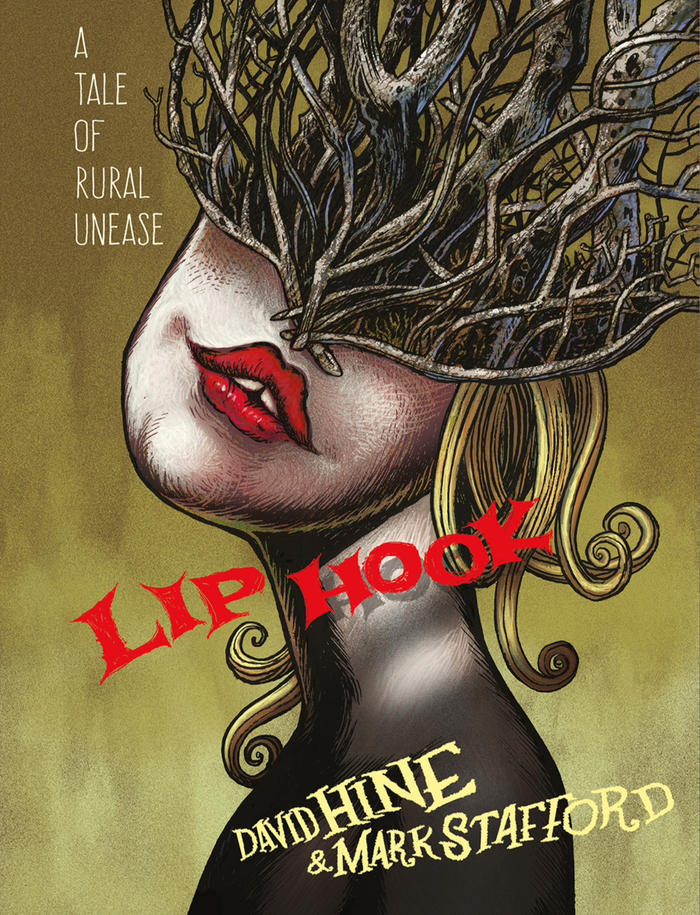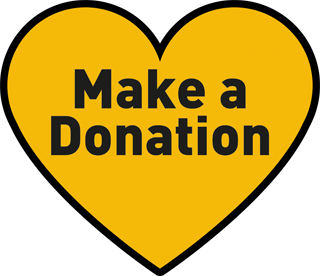Every year, in the countdown to the Lakes International Comic Art Festival, we bring you a series of interviews with guests at the event. This “Festival Focus” for 2018 is David Hine, who has been working in comics since the early 1980s.
After his graphic novel Strange Embrace was published in the US, he was hired by Marvel to write several series, including District X, Daredevil: Redemption, Silent War and Spider-Man Noir.

He also created Poison Candy for Tokyopop and The Bulletproof Coffin (with Shaky Kane) for Image Comics.
He has created numerous books for DC, including Batman, Detective Comics, Azrael and The Spirit.
More recently, he collaborated with fellow Festival guest Mark Stafford on a British Comic Award-nominated adaptation of Victor Hugo’s The Man Who Laughs. His latest book, also drawn by Mark Stafford, is the graphic novel Lip Hook, which launches from SelfMadeHero at the Festival.
David, what are you working on, comics-wise, right now, and when will it be published?
David Hine: I have just completed Lip Hook, a graphic novel, with artist, Mark Stafford. That is published by SelfMadeHero and will launch at the Lakes Festival. Mark and I also have a series called The Bad Bad Place, which is nearing completion in the Meanwhile anthology from Soaring Penguin.
I have scripted a 10-part series featuring the Dark Judges for the Judge Dredd Megazine. That is my first work for the 2000AD stable since the mid 1990s! Nick Percival is illustrating that one and it began in the 400th issue of the Megazine, out now.

Then I’m working on a few comics and comics-related projects with writing partner Brian Haberlin for his Anomaly Publications studio in the United States.
Which comic project you’ve worked on are you most proud of and where can people see it or buy it?
David: I’m very pleased with Lip Hook as well as all the other work I’ve done with Mark over the years. I think the adaptation of Victor Hugo’s novel The Man Who Laughs was very successful and always gets great feedback, often from people who are new to reading comics. The Bulletproof Coffin, with artist Shaky Kane, is the most unique comic I ever worked on and one where we really went into some unexplored territory. I still rate Strange Embrace, published back in the 90’s, mostly because I actually managed to write and draw that one.
All of those are available from most good comic stores and bookshops. Order them if they’re not in stock. They are also available from the usual online sources and Strange Embrace can be bought digitally from the Sequential digital store, in a very special edition that includes my spoken commentary, interviews, sketches, original script and other goodies.
How do you plan your day as a creator? (Do you plan your day?)
David: I rarely plan my day in any detail unless there is an urgent deadline. In that case the plan is “Head down, pedal to the metal until it’s done.” I’ve never had a set method of working. I will jump around from project to project, sometimes working in a café or on a plane or train if I’m traveling, but mostly at home where I will wander from room to room with laptop or notebook.
A lot of the important work is done while staring out of the window, going on walks or lying in bed, though for some reason, people often don’t seem convinced when I tell them that.
What’s the best thing about being a comics creator?
David: See above. I hate having a regimented schedule and I have managed to avoid it for most of my life.
And the worst?
David: The deadline. To be honest, it’s when the deadline looms that the most boring part of the job gets done. I love plotting, writing dialogue, sketching layouts, but in the end a script requires a disciplined panel-by-panel description, which has to include every detail the artist needs in order to illustrate on the page, what I have in my head, and that can be a bit tedious.

What most distracts you from getting your work done?
David: Requests for interviews! Obviously internet has brought myriad distractions. I usually start my day by going through emails as well as messages on Twitter and Facebook. There are a lot of requests to attend comics festivals, respond to written interviews or live podcasts, and increasingly, people contacting me through Facebook with requests to read their proposals for comics, sometimes to read and comment on entire graphic novels or to write introductions to books or quotable comments for publicity. I don’t mind doing it. It’s nice to know people want my opinion and I’d probably worry if it stopped happening, but it does take a big chunk out of the day.
Do you think it’s easier or harder for young comic creators to get published today?
David: Easier to publish, harder to make a living. What I mean by that is there are far more publishers as well as the possibility to self-publish, but very few will be published by mainstream publishers who pay a living wage.
The most requests I get are from people asking me to help them get published through someone I have previously worked for, whether that’s Marvel or DC, or Image, or SelfMadeHero. Every publisher is swamped with submissions and in the end it will be the best and, more importantly, the most unique work that is accepted.
A lot of people are simply producing new versions of successful concepts. They really need to find an original voice and have something new to say.
Have you ever been to the Lake District before and if so what did you think of it? If you haven’t, what are you expecting?
David: I attended the first festival and was very impressed by the fact that it followed the model of Book Festivals and overseas festivals like Angouleme. Events and exhibitions were spread across the town and there was a greater emphasis on making talks and panels more in-depth and engaging than your standard comic convention panel.
I particularly enjoyed an interview I did where David Bishop interviewed myself and Doug Braithwaite, while Doug sketched live. It was a very relaxed atmosphere and I’m sure the audience found it far more entertaining to watch Doug draw than just listen to our voices.
The choice of invited guests was impressive too. The whole thing felt like it was more about the act of creating comics than about being fans of particular comics or characters.
Which one comic creator would you most like to meet, and why?
David: I would like to cheat and say the Hernandez brothers. I did briefly meet Gilbert Hernandez once but not in a situation where I could really chat to him. I have come to know the characters in their books over the decades and grown older with them. I’d love to have the chance to find out what it has been like for them to watch those same characters age under their guidance.
How do Festivals and other comics events help creators most, do you think?
David: Well, I started out making comics at a time when you didn’t really get feedback from the public at all, except through an occasional hand-written letter and the one annual comic convention in London. Often I would have no idea what readers thought of my work. The clear advantage of today’s conventions is the opportunity to hear directly from the public what they enjoyed (and what they didn’t like) about the comics I’ve written.
The most gratifying conversations have been with people who picked up a comic from me at a convention, then came back the next year to tell me they enjoyed it. You can’t get much more direct feedback than that.
What one piece of advice do you offer people looking to work in the comics industry
David: Practice your craft. It takes a very long time for most artists of any kind to develop their skills to a point where they can consider themselves professional. Use the internet to show your work so that you can get feedback. When you think you are ready, self-publish. It’s not that expensive these days to print off a couple of hundred copies of a comic. Then get a table at a convention so you can test the market for your work.
As I said before, you must be very good at what you do and also find your own voice. If you are good enough you should find professional work eventually. There are exceptions. There will always be creators who are so off the beaten path that they will only ever find a small cult following. That has always been true in all the arts.
However, right now, the medium is more open to diverse voices than it ever was in the past.
What’s your favourite comic right now and where can people get it?
David: I’m cheating again because the most interesting publishing venture I’ve come across recently is ShortBox, which is a quarterly selection of five independent comic books by various creators, which you can order from their web site at shortbox.co.uk.
You can also order individual issues. Indie comics can be very hit-or-miss and ShortBox is high on the hits.
David, thank you very much for your time and we look forward to seeing you in Kendal.
• The Lakes International Comic Art Festival will be back in Kendal 12th – 14th October 2018. Tickets for the Festival are on sale now from: www.comicartfestival.com
• Follow the Lakes International Comic Art Festival on Facebook | Twitter | Podcast
DAVID HINE ONLINE
• Web: www.waitingfortrade.com
• Twitter: @hinedavid


